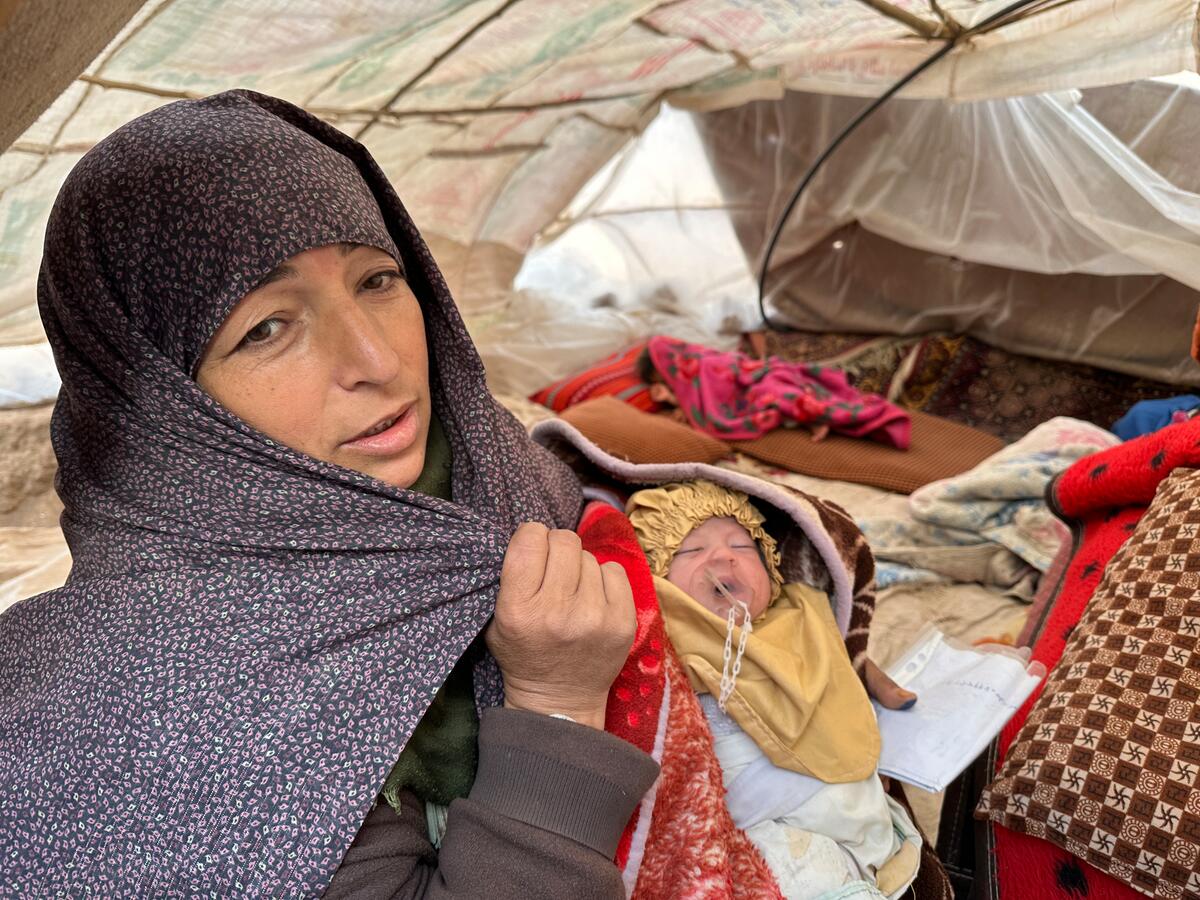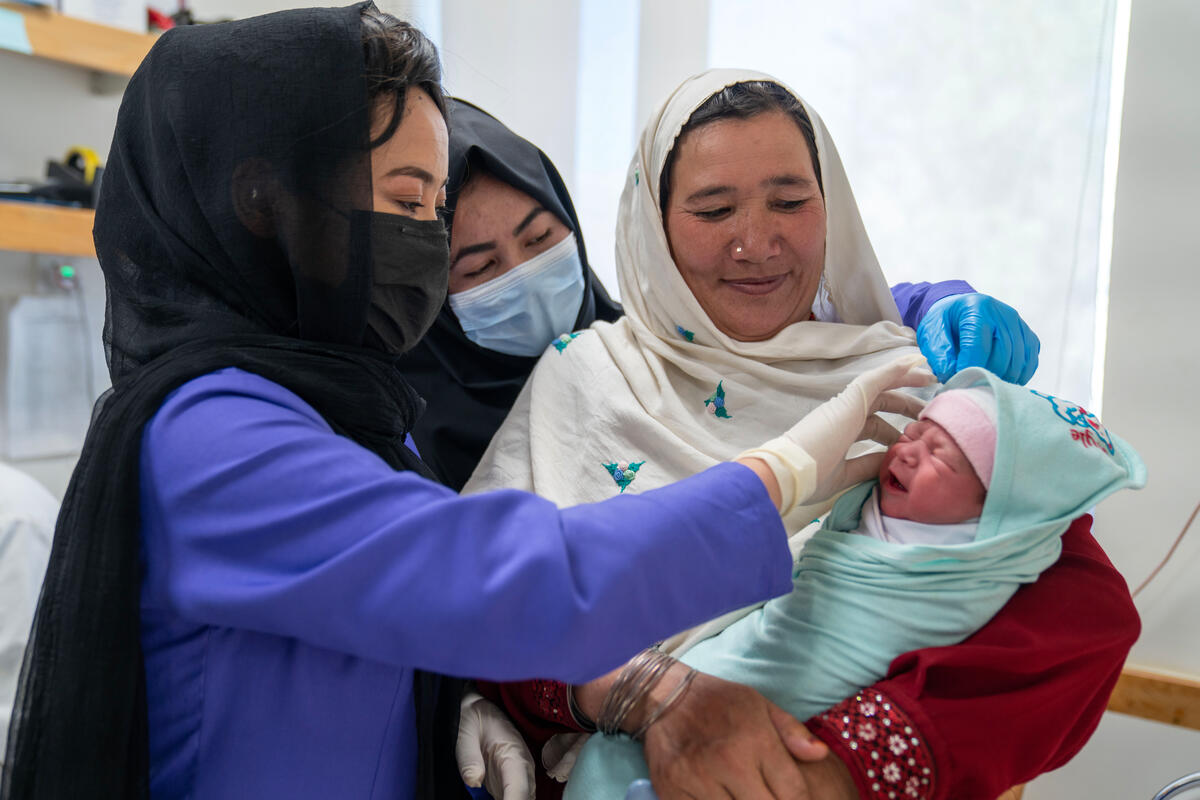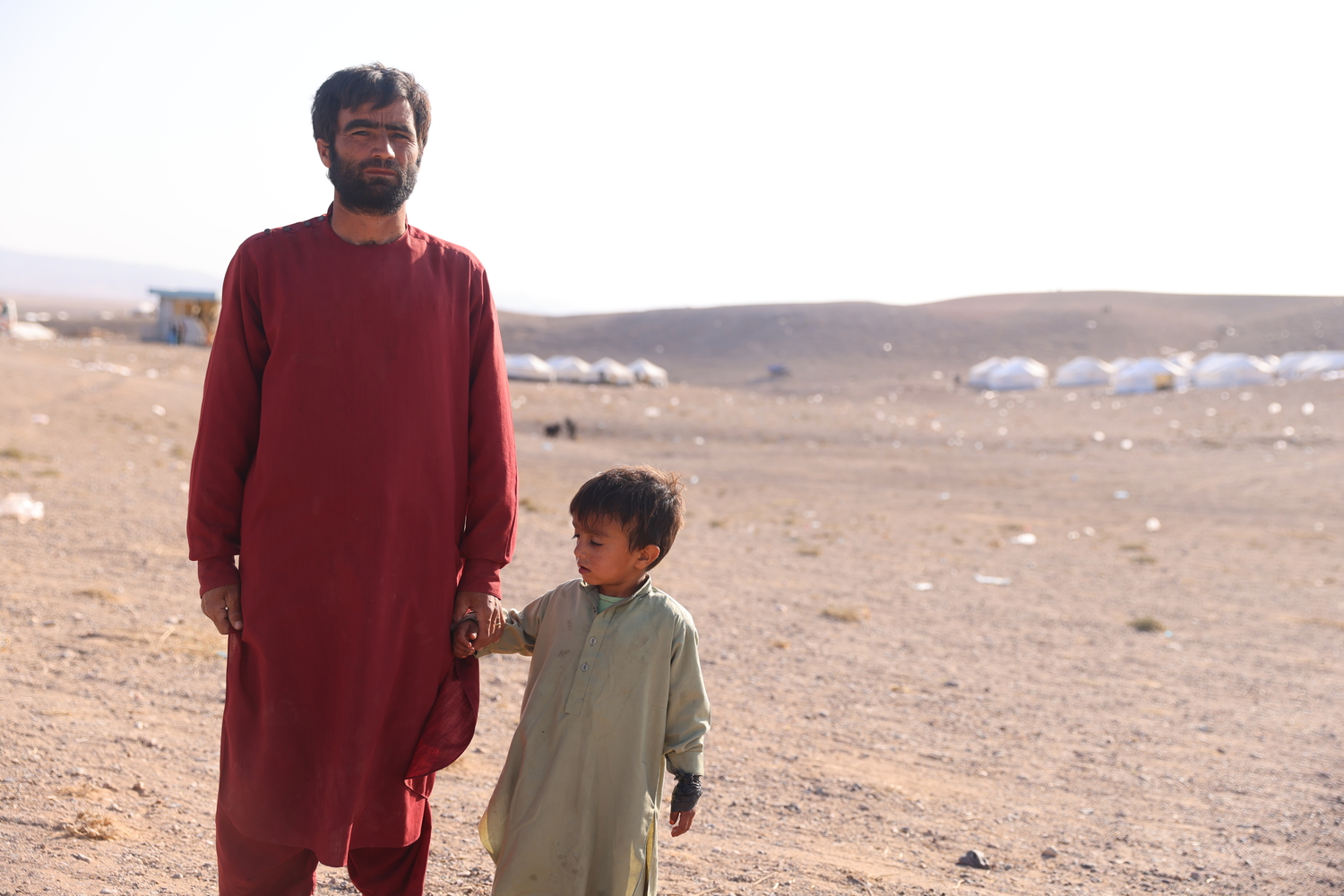Afghanistan Humanitarian Update No. 45
Afghanistan Humanitarian Update No. 45
At a Glance:
- UNHCR's first airlift lands in Kabul
- More Afghans head homewards
- Refugees still flee
- UNHCR staff deploy to Mazar, strengthen Herat
UNHCR's first airlift arrives in Kabul
UNHCR boosted its relief stocks in Afghanistan's capital with the arrival Thursday afternoon at Kabul's Bagram airfield of an Italian government-chartered Ilyushin 76 aircraft loaded with 31 metric tons of relief aid from the UN's stockpile in Brindisi, Italy. The giant cargo plane, facilitated with support from the World Food Programme, transported urgently needed humanitarian aid donated by Italy for UNHCR's emergency winter assistance packages.
Thursday's airlift included thousands of blankets, jerry cans, kitchen sets, tents, plastic tarpaulins, soap and health kits valued at more than $98,000, all financed by the Italian government.
A UNHCR-hired truck transporting the freshly-arrived goods from Bagram to Kabul along the recently christened "new" road apparently strayed from the cleared path on Thursday and hit a landmine. No one was injured in the incident, and mine-clearing personnel travelling with the UNHCR convoy ensured that the driver and vehicle could be moved to a cleared zone.
Beginning Friday, UNHCR will distribute some of the newly arrived relief items to some 1,500 people from 215 families who left the Chardehi district on the edge of Kabul and fled to the capital over recent months.
Under its ongoing distribution programme for its emergency winter assistance packages, beginning next week UNHCR will distribute aid to some 50,000 people from 10,000 vulnerable families living in Kabul and three neighbouring provinces to help them better cope during the harsh winter season. The winter assistance packages contain blankets, quilts, sweaters, mats, plastic tarpaulin, coal and food aid from the UN's World Food Programme meant to help destitute families survive the harsh winter months. Many of the Afghans participating in the relief distribution are internally displaced persons from the heavily-mined Shomali plains north of the capital, formerly a prime agricultural region.
Further northwards along Afghanistan's border with Tajikistan, UNHCR on Thursday distributed aid to some 10,000 displaced Afghans camped at sites in the Pyandj River. Blankets, mattresses, soaps, candles, matches, clothing, kitchen sets and buckets were distributed by UNHCR and its partners to families living on Karavul island. The World Food Programme also provided food aid to the Afghans who have been encamped in the river plain for much of the last year.
More Afghans head homewards
Return movements to Afghanistan rose during the week, with nearly 4,000 Afghans spontaneously repatriating on Wednesday in a trend that may be linked to their desire to celebrate Eid with relatives rather than a sustained repatriation movement. Thursday's voluntary returns were lower, with only 1,266 persons returning from Iran while more than 1,000 people crossed into Afghanistan at Pakistan's Chaman crossing.
Wednesday's record-breaking returns included more than 1,900 Afghans who repatriated via Iran's Dogharoun crossing point that lies between the eastern Iranian city of Mashad and Herat, while some 1,900 people also returned home via the Chaman frontier crossing. Both main crossing points from Iran and Pakistan's Balochistan province recorded more than 3,600 returns on Tuesday.
More than half the Afghans returning from Iran are coming from as far westwards as Teheran, where many of them have lived for years, and report that that they are returning to Herat, Kandahar, Ghazni, Zabul, and Kabul provinces. More than 30,000 Afghans have voluntarily repatriated from Iran since Herat fell to anti-Taliban forces on Nov. 12.
Refugees still flee
In southern Afghanistan, small numbers of refugees are still leaving Kandahar Province's Spin Boldak region for the safety of UNHCR camps in Pakistan. Movements from Afghanistan seem to have declined following the recent appointment of a new governor by anti-Taliban forces controlling the region. The rate of daily refugee arrivals at the Chaman border crossing is approximately 300 persons a day, lower than in past weeks when up to 2,000 persons were crossing daily.
Recent arrivals at the Pakistan border town of Chaman had said that they feared increasing inter-tribal disputes and the possibility that civil war might erupt in the volatile region, while others want to join families who previously left Afghanistan. UNHCR is anxious to see the region's new authorities restore law and order as soon as possible so that it can re-establish its Kandahar office and assist the region's displaced population as well as those Afghans who may begin returning to the province.
UNHCR continues to register Afghans at the Killi Faizo staging site, which currently shelters some 4,500 Afghans. There are currently more than 18,000 refugees accommodated at UNHCR's Roghani camp. The neighbouring United Arab Emirates' Red Crescent-sponsored camp shelters 2,000 Afghans.
On Friday, UNHCR expects to open a new refugee site some five kilometres from Roghani at Landi Karez, at the edge of the daunting Kohjak hills that tower above Chaman.
A serious security incident took place on Wednesday when several trucks operated by the relief agency CONCERN were halted along the route between Quetta and Chaman and a shooting incident erupted, killing one local driver. Pakistan authorities are investigating the murder.
UNHCR staff deploy to Mazar, strengthen Herat
UNHCR staff together with UN partner agencies crossed the Friendship Bridge separating Uzbekistan from Afghanistan on Tuesday and returned to Mazar-i-Sharif, a city devastated by fighting and recent looting.
It was the first time in more than five years that relief workers have rolled across the famed bridge. Tuesday's convoy of aid workers marked the UN's return to northern Afghanistan's principal city following a three month-long absence after the world body's withdrawal of its international staff from Afghanistan in the wake of the terrorist attacks in the US last September.
UNHCR plans to transfer some 7,000 metric tons of aid supplies from Termez to Hairaton, Afghanistan, the main logistics base north of Mazar-i-Sharif, in the coming days. Operating from Mazar, UNHCR initially intends to assist some 65,000 people in the region. UNHCR is particularly keen to evaluate what activities can be implemented in the war-ravaged and several times pillaged city in order to help people returning to the region. Together with personnel from other partner agencies in the city, staff will be evaluating needs of the region's internally displaced persons and vulnerable groups,
Following reports that Afghans returning home from as far away as Teheran have reached Maymana in Faryab Province to the west of Mazar, UNHCR will dispatch a mission to the community to review the needs of returnees in the area.
As soon as staff restore UNHCR's office in Mazar, which was looted in the weeks following the withdrawal of expatriate aid workers from the city last September, we hope to re-establish offices in Kunduz and Pul-i-Khumeri. There are currently four UNHCR expatriate staff in Mazar-i-Sharif and more will be deployed to the city over the coming days. The city seems calm and stable, although the security situation remains far from ideal.
To the west in Herat, UNHCR has boosted its presence and now has three expatriate aid workers and 20 Afghan colleagues working in the city, with more staff on the way. In Herat, UNHCR will be working closely with the International Organization for Migration which oversees relief distribution to displaced Afghans encamped in the sprawling Maslakh camp.
Over recent days, UNHCR aid convoys totalling 25 trucks have reached Herat, arriving from both Turkmenistan and Iran. Additional convoys are expected to arrive following the Eid celebrations.
Southwards, in Kandahar, three local UNHCR staff opted to return home on Wednesday from Quetta, Pakistan, to check on their properties and to see their families. Some 20 of UNHCR's Afghan and expatriate staff formerly based in Kandahar remain in Quetta, where they await the green light to resume operations in the city that was only recently wrested from Taliban control.








